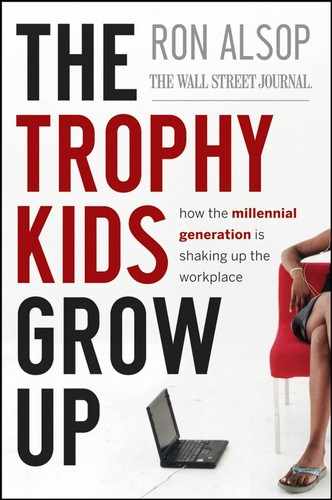2.1. MERITOCRACY FOR MILLENNIALS
There is little that millennials detest more than a rigid timetable for career advancement. The millennials have world-conquering ambition and don't want to feel constrained in the slightest. They want a true meritocracy that rewards performance regardless of years of seniority. That attitude, of course, doesn't fly at many law firms, investment banks, and other employers.
The millennials' belief in meritocracy should square quite nicely with the American ideal of achieving success through pluck and initiative. It's just that corporate hierarchies, union seniority rules, office politics, and other workplace dynamics sometimes interfere with the millennials' lofty goals.
Luke McGee, a senior analyst in investment banking at Merrill Lynch & Co., put in 15 hours or more a day and spent weekends at the office after joining the firm in 2005. So far, the Duke University graduate feels that the brutal schedule is paying off. He has been allowed to interact more directly with clients, which has helped sharpen his communication and presentation skills. "Despite my junior status and relatively short tenure here, I am often asked to express my view," he says. "The fact that senior bankers trust my ability to speak lucidly in front of clients and that they think I have a differentiated point of view is something I greatly appreciate."
Still, he wrestles with his frustration over the time it will take to rise to the level of managing director. "In a perfect world, Merrill would be a complete meritocracy in which seniority played much less of a role," he says. "I recognize that experience matters, and there is something to be said for having seen many things. However, I feel strongly that different bankers develop at different paces, and those who excel should be both advanced and compensated according to ability."
McGee has talked with colleagues about the long road to managing director and found some sympathy for his perspective. "I can't say that I have been completely satisfied with the response, but I appreciate that I have been able to have candid conversations," he says. "It's my hope that the system will at some point be less rigid. However, I realize that this career path is almost identical to the rest of Wall Street, so it's an industry issue."
Will McGee wait his turn at Merrill? He isn't making any promises. "I would like to think I can have a long-term career at Merrill," he says. "At some point, I can see myself wanting to take on new challenges. If those new challenges are available at Merrill, I will obviously explore the opportunity to stay here. If, for whatever reason, the fit isn't right at Merrill, I'll move on."
Not all companies adhere to lockstep promotion tracks. Millennials like McGee would likely feel less impatient at the Oliver Wyman management consulting firm. "We are a true meritocracy where people can progress rapidly to partner, often in as little as six years from their undergraduate education and without the need for an advanced degree," says Matthew Bennett, director of global recruiting. "This generation wants a place where progression is measured with a speedometer, not an odometer, and where there are no artificial ceilings on career movement."
Oliver Wyman finds that its promise "to get people there faster" resonates strongly with millennial students, as does the prospect of gaining access to senior colleagues and clients very early in their careers. "While they don't expect to be cracking the problem all the time," Bennett says, "they want to sit at the table when it is being done rather than sit in a cubicle somewhere cranking out analyses."
